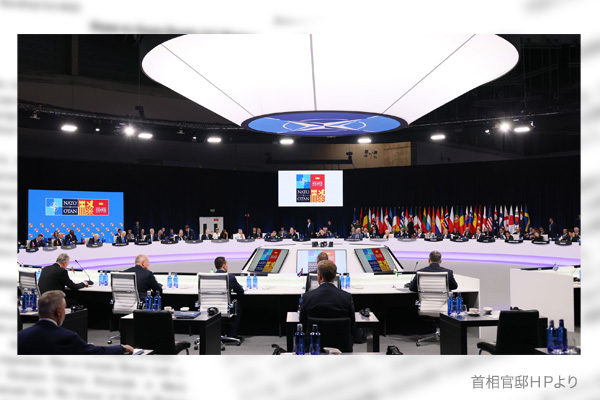In a historic development, European and Indo-Pacific democracies have joined hands in a manner to encircle Eurasian autocracies. The North Atlantic Treaty Organization has adopted its new “Strategic Concept” for the next decade positioning Russia as a “direct threat” and China as a “systemic challenge,” passing a point of no return in the new Cold War. Japan that faces the China-Russia axis in the east now keeps in step with Europe in imposing sanctions on Russia, having developed a strategic environment for its cooperation with NATO also in the Indo-Pacific.
Ukraine war awakens West
U.S.-Europe relations deteriorated in recent years to the extent where former U.S. President Donald Trump criticized NATO as “obsolete” and French President Emanuel Macron described it as “brain dead.” Russian President Vladimir Putin, who has an impulse to revive Russia as a strong power, may have thought that the time was ripe for him to launch a war of aggression against Ukraine that he sees as within Russia’s inherent sphere of influence. Like the Korean War under the U.S.-Soviet Cold War in the 1950s, Russia’s war of aggression against Ukraine has awakened the complacency of the free world at a blow. Before the Korean War, former British Prime Minister Sir Winston Churchill’s “iron curtain” speech calling for vigilance to the Soviet Union was not enough to awaken the West. But the “hot war” on the Korean peninsula became a turning point for the free world to fight the Cold War beyond rhetoric.
Under the Trump administration in October 2018, then Vice President Mike Pence made clear the United States’ confrontational approach to China in a speech, vowing to end the days when the U.S. overlooked China’s disturbance of international order. U.S. strategists noted at that time that the Pence speech ushered in a new U.S.-China cold war. But not a few Americans questioned why the U.S., exhausted by the Afghanistan war, should protect faraway countries like the Baltic states or Taiwan. Even the Pence speech fell short of awaking American people, while Europe kept a distance from the new U.S.-China cold war.
But a joint statement by Russian President Putin and Chinese President Xi Jinping in early February expressed opposition to NATO’s eastward expansion and described China-Russia friendship as unlimited, leading Western countries to become more vigilant. In this way, Russia’s aggression against Ukraine revitalized straying U.S.-Europe relations as representing a challenge by the China-Russia axis. The hot war in Ukraine accelerated the West’s new cold war with China, a behind-the-scenes player of the Ukraine war.
Japan under pressure to increase defense spending
As the war was prolonged, however, Germany and Italy were plagued with domestic feuds over the provision of heavy weapons to Ukraine. Reelected French President Macron saw his weakened political base, as shown by growing support for his ultra-rightist rival Marine Le Pen who keeps a distance from NATO. Under such strategic environment, the NATO summit in late June successfully accelerated efforts to enhance NATO solidarity to wage the new cold war.
More important still, NATO not only named China and Russia as security concerns but also made clear its cooperation with Japan and other non-NATO countries to prepare for an increasingly severe security environment. Particularly, NATO leaders explored cooperation with Japan as the cornerstone of the Indo-Pacific. At the NATO summit, Japanese Prime Minister Fumio Kishida spoke about his determination to fundamentally enhance Japan’s defense capabilities within five years and secure a substantial increase in defense spending. He should acknowledge the significance of his own international commitment.
Hiroshi Yuasa is a Planning Committee member and a senior fellow at the Japan Institute for National Fundamentals. He is a columnist for the Sankei Shimbun newspaper.


